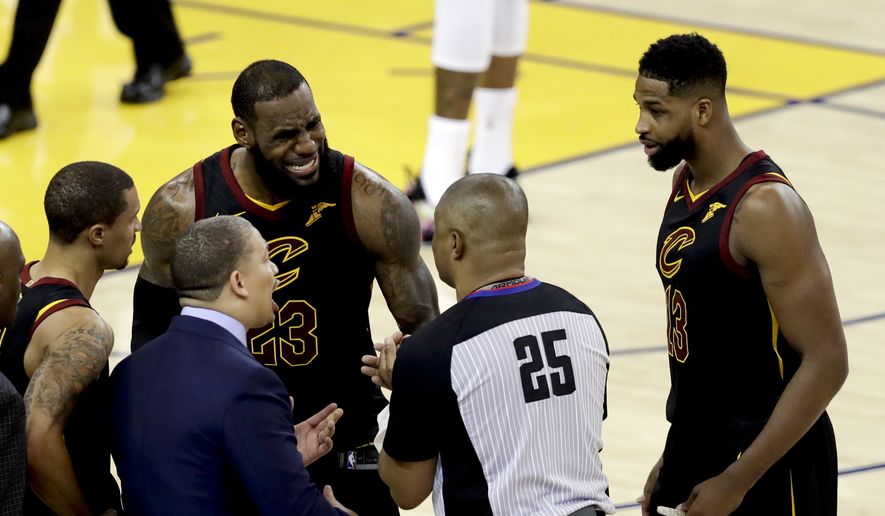Bad calls aren’t deciding the NBA Finals

By DERON SNYDER (as published in The Washington Times)
LeBron James leaped as he ran toward the basket and caught a high pass around the foul line Sunday in Game 2 of the NBA Finals. While still in midair, he was sandwiched by Stephen Curry and Klay Thompson, who hit him from the front, left and back. The contact caused him to stumble and stagger across the baseline with basketball in hand.
A referee directly in front of the Warriors bench was in great position and viewed the entire sequence. He watched James tumble out of bounds and crash into the stanchion. The official paused before giving a quick chirp-chip on his whistle and pointing the other way, awarding possession to Golden State.
“I mean, come on,” broadcaster Jeff Van Gundy said during replays of the blatant foul that wasn’t called. Co-analyst Mark Jackson asked, “What are you watching if you’re not watching that?” Play-by-play announcer Mike Breen stated what we thought was common knowledge: “Gotta give him space to land.”
The worst team on the floor through two games of the Finals has been the referees.
They were excoriated for reversing a Kevin Durant charge into a James block with 36 seconds left in the opener, leading coach Tyronn Lue to say the Cavaliers were “robbed,” a widely held sentiment in the court of public opinion. Nonetheless, Game 1 will be remembered for J.R. Smith’s brain freeze more than anything else, a gaffe that might’ve cost Cleveland a monumental upset.
Game 2 brought more bewildering calls/non-calls that seemed to favor Golden State – and not just the high-low hit on James – but they were largely inconsequential. The result, a 122-103 blowout, was more in line with expectations heading into the Finals. The Warriors reduced their one-on-one play and returned to the beautiful style of free-flowing hoops built on ball movement and player movement.
We’d much rather discuss masterpieces like Curry’s nine 3-pointers in Game 2, or James’ 51-point gem in an overtime loss, instead of dissecting the officials’ performance. But refs’ shaky outings cause conspiracy theorists to reappear as reliably as cicada, and drone on just as annoyingly. Whenever disgraced former referee Tim Donaghy comes out of his hole – he appeared on Cleveland’s 92.3 The Fan after Game 1 – it’s never a good thing.
Complaints about officiating probably began shortly after James Naismith hung the first peach baskets. Depending on which team or fan base is asked, a referee swallows the whistle or blows it every third breath. Superstars are either getting preferential treatment – like when James “was fouled” while dislodging Jordan Bell and nearly breaking his arm on an inbounds play – or officials are issuing makeup calls – like the phantom tip that allowed Golden State to retain possession after Curry didn’t earn a foul on a forced, left-handed, lean-in 3-point attempt.
The proliferation of slow-motion replays and the viral nature of social media contribute to the problem, or the perception of a problem, not just in the NBA but other major sports leagues, too. But judgement is such a large part of NBA calls, reaching consensus can be impossible in block/charge, traveling, or whether contact was sufficient for a foul. And the home team seems to get the benefit when calls are in doubt.
In a 2009 survey, 41 percent of “casual” or “avid” NBA fans said it’s likely or somewhat likely that the league alters the outcome of games. Such sentiments helped lead the NBA to release “Last Two Minutes Reports,” rating how well officials did on calls and non-calls in the last two minutes and overtime.
Now, after a steady increase in the types of plays and situations that can be reviewed via replay over the last decade, the league plans to experiment with a coach’s challenge system during Las Vegas Summer League.
“The competition committee has been trying to figure out how we actually do this, because there’s some complications,” NBA executive vice president of basketball operations VanDeWeghe said Sunday on SiriusXM. “It’s not quite as simple as you might imagine.”
Simple or not, the last thing we need is additional timeouts down the stretch, action grinding to a halt as officials don headphones and huddle around a monitor. Allowing a coach to challenge fouls in the closing minutes or, even worse, any time during the contest would be a drag, literally.
Frustration would remain on decisions that could go either way, leaving us no better off with replay as an option. A review presumably would’ve reversed Golden State’s takedown of James on Sunday. But not every non-call is as obvious as that.
In the end, contests will feature their share of bad shots, bad passes and, unfortunately, bad calls.
Rarely, if ever, is an outcome determined by the latter, no matter how egregious.
— Brooklyn-born and Howard-educated, Deron Snyder writes his award-winning column for The Washington Times on Tuesdays and Thursdays. Follow him on Twitter @DeronSnyder.
 Follow
Follow
